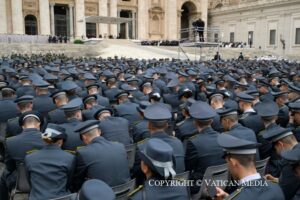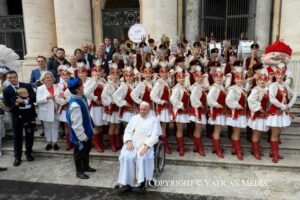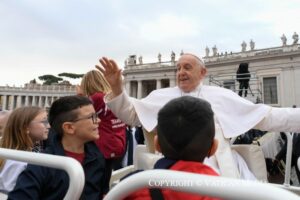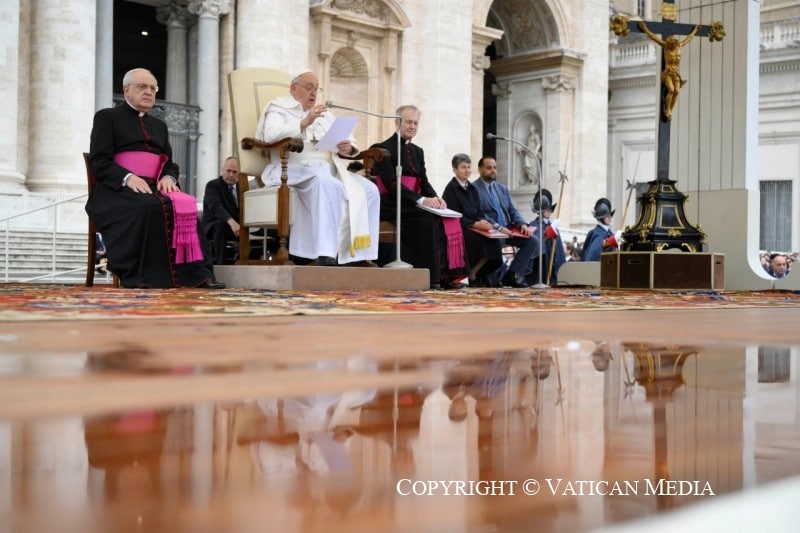This morning’s General Audience took place at 9:00 a.m. in St. Peter’s Square.
In his address in Italian, the Pope, continuing the cycle of catechesis Passion for Evangelisation: the apostolic zeal of the believer, focused his meditation on the theme “Saints Cyril and Methodius, apostles of the Slavs” (Reading: Acts 11:2-4.15.17).
After summarising His catechesis in the different languages, the Holy Father addressed special expressions of greeting to the faithful present. He then made an appeal for peace in the Middle East, Ukraine, and other war-stricken regions.
The General Audience concluded with the recitation of the Pater Noster and the Apostolic Blessing.
Cycle of catechesis. The passion for evangelization: the apostolic zeal of the believer. 24. Saints Cyril and Methodius, apostles of the Slavs
Dear brothers and sisters, good morning!
Today I will talk to you about two brothers, very famous in the east, to the point of being called “the apostles of the Slavs”: Saints Cyril and Methodius. Born in Greece in the ninth century into an aristocratic family, they renounced a political career to devote themselves to monastic life. But their dream of a secluded existence was short-lived. They were sent as missionaries to Great Moravia, which at the time included various peoples, already partly evangelized, but among whom many pagan customs and traditions survived. Their prince asked for a teacher to explain the Christian faith in their language.

Very soon, however, some opposition emerged on the part of some Latins, who saw themselves deprived of their monopoly on preaching to the Slavs; that fight within the Church, it is always that way. Their objection was religious, but only in appearance: God can be praised, they said, only in the three languages written on the cross: Hebrew, Greek and Latin. They had a closed mindset, to defend their own autonomy. But Cyril responded forcefully: God wants every people to praise Him in their own language. Together with his brother Methodius, he appealed to the Pope and the latter approved their liturgical texts in the Slavic language. He had them placed on the altar of the Church of Saint Mary Major, and sang with them the Lord’s praises according to those books. Cyril died a few days later, and his relics are still venerated here in Rome, in the Basilica of Saint Clement. Methodius, instead, was ordained a bishop and sent back to the Slav territories. Here he would suffer a great deal: he would even be imprisoned, but, brothers and sisters, we know that the Word of God was not shackled and spread throughout those peoples.

First of all, unity. The Greeks, the Pope, the Slavs: at that time, there was an undivided Christianity in Europe, which collaborated in order to evangelize.
A second important aspect is inculturation, of which I said something earlier: evangelizing the culture and inculturation show that evangelization and culture are closely connected. One cannot preach the Gospel in an abstract, distilled way, no: the Gospel must be inculturated, and it is also an expression of culture.
A final aspect is freedom. Preaching requires freedom, but freedom always needs courage; a person is free to the extent that they are courageous and do not let themselves be shackled by many things that take away their freedom.
Brothers and sisters, let us ask Saints Cyril and Methodius, apostles of the Slavs, that we may be instruments of “freedom in charity” for others. To be creative, to be constant and to be humble, with prayer and with service.
__________________________________________

I greet the English-speaking pilgrims and visitors taking part in today’s Audience, especially the groups from England, Ireland, Albania, Denmark, Norway, Zimbabwe, Indonesia, the Philippines, Vietnam, Canada and the United States of America, in particular the Patrons of the Arts in the Vatican from Louisiana, the members of the Association of State Catholic Conference Directors and a group of military chaplains. Upon all of you and your families, I invoke the joy and peace of our Lord Jesus Christ. May God bless you!
I think always of the grave situation in Palestine and Israel: I encourage the release of the hostages and the entry of humanitarian aid in Gaza. I continue to pray for those who suffer, and to hope for paths of peace in the Middle East, in beleaguered Ukraine, and in other regions afflicted by war. I remind you all that the day after tomorrow, Friday 27 October, will be a day of fasting, prayer and penance: at 18.00, in Saint Peter’s Square, we will gather together to implore peace in the world.
______________________________________________
APPEAL
I think always of the grave situation in Palestine and Israel: I encourage the release of the hostages and the entry of humanitarian aid in Gaza. I continue to pray for those who suffer, and to hope for paths of peace in the Middle East, in beleaguered Ukraine, and in other regions afflicted by war. I remind you all that the day after tomorrow, Friday 27 October, will be a day of fasting, prayer and penance: at 18.00, in Saint Peter’s Square, we will gather together to implore peace in the world.
____________________________
Summary of the Holy Father’s words
Dear Brothers and Sisters: In our catechesis on apostolic zeal, we have been reflecting on the spread of the Gospel through the witness of Christians of every time and place. Today we turn to Saints Cyril and Methodius, two brothers who are venerated as “the Apostles of the Slavs” for their outstanding missionary work among the peoples of Moravia. As part of their effort to proclaim and inculturate the word of God among the Slavic peoples, they developed the Cyrillic alphabet, which made it possible to preach God’s word and to celebrate the Divine Liturgy in the language of the people. Encountering opposition, they came to Rome, where they received support from the Pope. Cyril died in Rome, while Methodius, now ordained a bishop, returned to continue the work of evangelization in the Slavic lands, where he died a martyr’s death. Saint John Paul II proclaimed Cyril and Methodius Co-Patrons of Europe in recognition of the abundant harvest of Christian faith and culture whose seeds they sowed. May the prayers of these two great Saints inspire among the peoples of Europe today a renewed commitment to the reconciliation, unity and peace that are the Holy Spirit’s gifts for the conversion of hearts and the building of a culture of authentic justice and fraternity.










